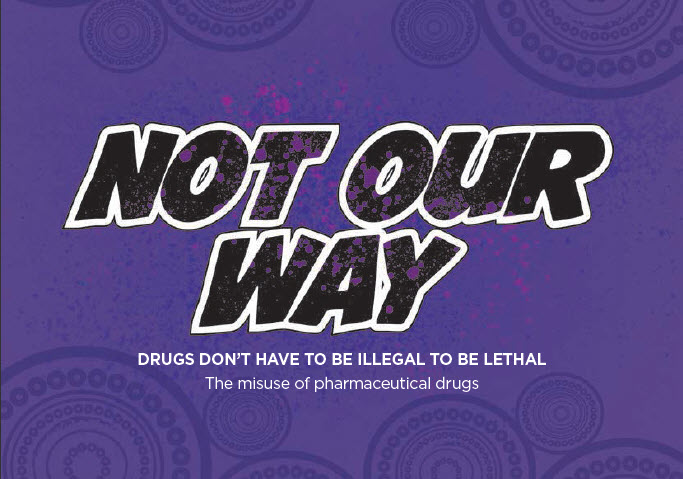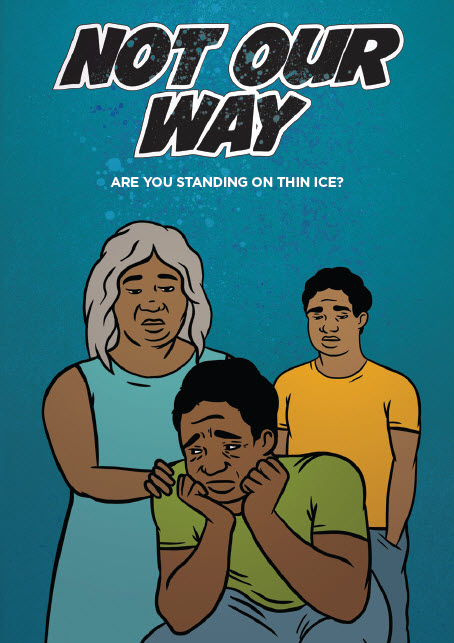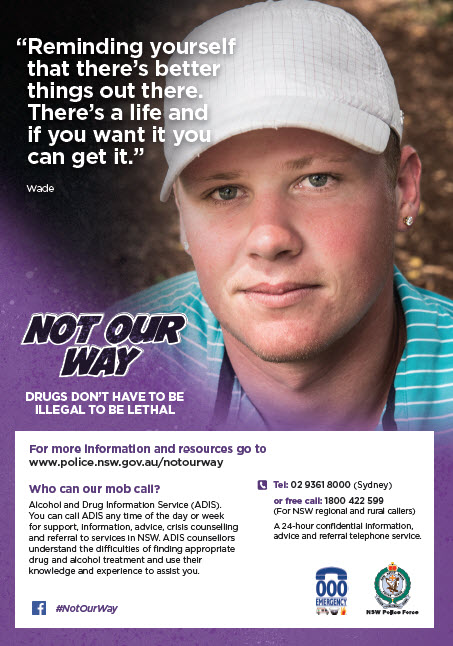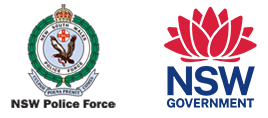Not Our Way is a campaign that focuses on the harms associated with the use of pharmaceuticals, ice and heroin and the impact this has on family and community. It also aims to provide advice for parents, families and friends of Aboriginal people with a pharmaceutical, ice or heroin dependency.
The messages were informed through a consultation process with members of the Aboriginal community and agencies in metropolitan and rural locations across NSW. The campaign is based on real stories and experiences of Aboriginal people across NSW who shared their experiences so they could help others.
Key message
The key messages of the campaign are to:
*Call Triple Zero for help from the police and ambos
*Don't be ashamed to ask for help
*Don't ignore the early signs and act fast before it is too late
Not Our Way - Heroin
A number of communities in NSW have experienced an increase in the use of opiates among members (of these communities).
Opiates are a class of drugs that include the heroin, synthetic opioids such as fentanyl, and pain relievers available legally by prescription, such as oxycodone (OxyContin®), hydrocodone (Vicodin®), codeine, morphine, and many others.
Our message to these communities is that if drugs are taking over, help is available.
The NSW Alcohol and Drug Information Service (ADIS) runs a confidential telephone counselling service, that's available 24 hours a day/7 days per week. It's toll free 1800 250 015
People don't have to put up with drugs being sold or made in their community. Call Crime Stoppers on 1800 333 000 or report online

Not Our Way - Ice
In NSW most people don’t use methylamphetamines. In 2013, 1.4% of people aged over 14 had recently used methylamphetamines. However, this research did show that Aboriginal people are 1.6 times more likely to use methylamphetamine.
More recently, there has been an increase in people seeking treatment and the rate of hospitalisations for methylamphetamine related problems has also increased. Aboriginal women are 10 times more likely, and the men are 6 times more likely, to end up in hospital.
So what has changed? There has been a significant increase in users reporting they are now using more frequently and have switched to the more potent form, ice. As a result, the problems caused by ice in our community are growing.
Pharmaceutical drugs provide many benefits including increasing our quality of life. Most people use these drugs appropriately, following the guidance provided by a doctor. However, the misuse of pharmaceuticals has been reported to be increasing and is emerging as an issue of concern.
Prescription medications are responsible for more drug-related deaths than illicit drugs, with the greatest increase occurring in rural and regional Australia. Research shows that Aboriginal people are 1.5 times more likely to misuse pharmaceutical drugs than non-Aboriginal people.
Campaign resources
To order hard copy resources, please visit the Your Room website
Story books

- Storybook: Are you standing on thin ice? (PDF)
- Storybook: Drugs don't have to be illegal to be lethal (PDF)
Booklet

Posters

- Poster: Not Our Way - Glenn (PDF)
- Poster: Not Our Way - Wade (PDF)
- Poster: Not Our Way - Aunty Gwen (PDF)
- Poster: Not Our Way - Chloe (PDF)


